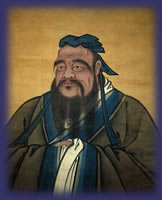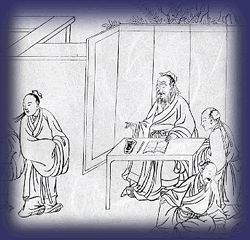“Is
it not a pleasure, having learned something, to try it out from time
to time?”
Analects 1.1

Kong Fuzi (‘Master
Kong’)
“How
dare I claim to be a sage
or a benevolent man? Perhaps it might
be said of me that I learn without flagging
and teach without growing weary.”
Analects VII.34
At
fifteen I set my heart on learning...
Analects,
II.4
The best known—and probably most influential—thinker in Chinese history was Kong Fuzi (551-479 BCE), known in the west by the Latin rendering of his name, ‘Confucius’. He was born Kong Qiu to an impoverished noble family in the state of Lu [12]; his father died a few years after his birth, and he was brought up by his mother. Most accounts of his life are based on Sima Qian’s Shi Ji (“Records of the Historian”) finished at the beginning of the first century BCE, by which time the solid kernel of facts about his life had become overwritten with legend. The most reliable source of Confucius’s own ideas is undoubtedly the Analects [13], the earliest parts of which were composed shortly after his death.
At
the time he was born, noble families engaged private tutors for their
children, lessons which were occasionally open to the offspring of other
court retainers. In addition, young men in office would be given training
by their superior officers. Books were bulky, written on bamboo strips
which were bound together with leather thongs, and libraries [14]
were confined to the homes of the nobility or offices of state. So it
is probable that much of Confucius’s
education was acquired when he was a junior officer in the administration.
“I
have listened in silence and noted what was said. I have never grown tired
of learning, nor wearied in teaching others what I have learnt.”
Analects VII.1

Confucius with his students
(detail of woodcut from
Ming Dynasty edition of Analects,
National Central Library, Taipei)
To
learn and not think [over what one has learnt] is useless;
to think without learning is dangerous.
Analects, II.15
Confucius’s long years of study of the classics convinced him that good government was dependent upon the benevolent and righteous behaviour of those in power. He was undoubtedly ambitious to put his ideas in practice, but there was scant opportunity for appointment to high office, as these posts were generally reserved for members of the nobility. The details of his employment and the travels he made—allegedly in search of a sympathetic ruler who would adopt his ethical principles—cannot be verified; however, what can be said with certainty is that he attracted a large body of students and devoted much of his life to teaching.
He was the first person in Chinese history who, acting in a purely private capacity, founded a school. A dedicated educator, he refused to apply any class distinctions, welcoming the poor as well as the rich [15]. Although he trained his students for government office, his main aim was to pass on his passion for learning and encourage in them an ethical attitude. He accepted more than 3000 students in his life, of whom 72 became outstanding scholars.
Confucius so completely won the affection and loyalty of those he taught that after his death they spread his ideas throughout the whole of the Chinese world. His prime hope was that education would develop character, and in this respect he was the educator par excellence, always checking his own behaviour so that he could serve as an example. It is no wonder that in several places today his birthday [16] is celebrated as “Teacher’s Day.”